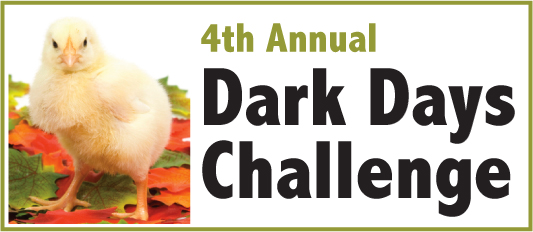What better way to kick off the month of December than join in a local food challenge! It’s dark, it’s cold, the growing season is over, right? Wrong! At least, not completely so. Thanks to Even’Star Farm‘s commitment to year-round farming, we receive a CSA through the winter. It consists of cooking greens, salad greens, and root vegetables (turnips, rutabaga, sweet potatoes, and radishes). As a result, we are cooking with local foods all through the winter; historically, the challenge has not been finding the food but rather finding new recipes to make that take us beyond our beans-and-greens rut.
For the purposes of the Dark Days Challenge, I am going to work on minimizing the non-local ingredients used in my cooking. The challenge is not only to use local food, it’s to keep as many ingredients as what the originator refers to as SOLE: sustainable, organic, local, and ethical. In this framework, the staples I buy that can’t be (easily) sourced locally fit the bill. Our organic oils are from Spectrum; I am particularly committed to their canola oil, in an effort to push back against the GMO-rapeseed that has become dominant in the United States. Sugar is certified fair-trade and organic, supplied by Wholesome Sweeteners; cocoa and coffee are also certified fair-trade and organic, from Equal Exchange. Organic spices are from Frontier, a member cooperative; butter is from Organic Valley, a regional farmers’ cooperative (milk, eggs, and cheese are from specific local farmers). Organic flour is from King Arthur, a regional company if you count Vermont as at all local to DC (I don’t necessarily, but still value East Coast products over West Coast ones); Bob’s Red Mill is another option for a (now) worker-owned company.
To supplement the vegetables in our CSA, I’ll visit the year-round farmers market in Takoma Park and shop the local items at My Organic Market (typically from Pennsylvania, from many of the same farms who supply our summer CSA). Already I know that I want to make a sweet potato pie, and am hoping that my favorite made-in-Philadelphia gingersnaps qualify as “local” for the purposes of the crust. Truly, with a new little person in the house, I don’t have the time or energy to go searching out more local sources for flour and grains and the like. For me, this challenge is about making the most of what we have readily available to us in the winter and instituting some regularity in blogging about it. For inspiration, I can always turn to recipes tried out by those who’ve done this before.
To start us off, I’ve compiled a list of the produce we already have on hand in the house:
- sweet potatoes (orange, cream, and Japanese purple)
- shallot, garlic, and onions
- green tomatoes
- Italian sweet peppers and Cubanelle peppers
- potatoes (red and white)
- squash (butternut and acorn)
- greens (arugula,
Chinese thick-stem mustard, salad mix, stir-fry mix, and parsley [more of them were destined for the composter than I realized]) - turnips, carrots, and radishes
- apples (Pink Lady, Gala, and Stayman)
- mushrooms (cremini and shitake)
- cranberries
- lemons (organic, but not local)
- pumpkin and squash puree [frozen]
- persimmon puree [frozen]
- tomato puree and juice [frozen]
- chopped kale [frozen]
- blueberries, cherries, rhubarb, and peaches [frozen]
There are probably things I’m forgetting, and we’re getting more tomorrow (our last summer delivery) and Thursday (our regular winter delivery). But that will do to get started.

One of our farmers’ markets is going to be open all winter! I’m so excited. We’ll still participate in the Winter Harvest buying club (run by the same org that runs the farmers’ market), but it is more fun to see the farmers and talk to them.
One of those farmers has started producing whole wheat flour and cornmeal, and I have a source for local all-purpose flour too. I don’t bake much, but I’m very pleased to have those local sources.
There is probably a local source for flour around here, I just don’t know where/what it is. (Although, I have read that regional mills may source the wheat from the Midwest, so it’s only half the challenge.) Our cornmeal is local-ish, from Cumberland, Maryland, so I’m fine to keep using that (and I just ignore the non-organic aspect; I bet you didn’t know I was capable of doing that!).
It’s hard to make the choice on some things: I really like Organic Valley’s European-style cultured butter, and I also really like that they’re a farmer-owned cooperative. But there are closer individual dairies I could be buying butter from, and I hate feeling like two groups I support are in competition with each other (at the moment there’s no local organic option readily available, so the scales still tip toward Organic Valley).